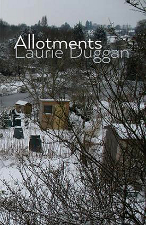
Allotments by Laurie Duggan
Shearsman Books, 2013
In 2012 Puncher & Wattmann published Laurie Duggan’s serial ‘Blue Hills’ poems in one collection. The ‘Blue Hills’ – a sequence that first appeared in Duggan’s The Great Divide (1985) and then reappeared intermittently through a number of subsequent books until being brought together in The Collected Blue Hills – are notational works concerned with the idiosyncrasies of place, or perhaps space, depending on one’s theoretical allegiances [if any]. The poems, as Duggan notes in the preface to the book, are ‘too intermittent and occasional’ for a long poem, and as he further notes, the collection’s ‘virtues stem from the poems not having made any promises to begin with.’ I think it’s fair to say that the ‘Blue Hills’ poems have developed something of a cult following over the years, and their provisional, notational quality, coupled with their wit, may have much to do with this. They are the type of poem where you will suddenly arrive at something like this:
A crazed accountant sits at a desk in the park
On the desk
Erica 4 Brian
I WANT TO SUCK COCKS
Log trucks cross the Bega flood bridge
all the poets have moved to Sydney (BH,p. 9)
The poems might ‘promise’ little, and yet the ongoing, open-ended nature of the work, the preoccupation with fragments of experience, the poetry’s commitment to surfaces over textual depths, and the distinct lack of pretension, now seem central to Duggan’s poetic.
I mention ‘Blue Hills’ because Allotments seems very much like a sequel to The Collected Blue Hills, a return to the short serial work, albeit one where the geographical location has shifted to the northern hemisphere. Rather than the investigations of Australian places in ‘Blue Hills’, and I use the term investigations very loosely, the poems in Allotments are situated in England where Duggan has lived since 2006. In this respect, as well as aligning Allotments with ‘Blue Hills’, it is also possible to read these poems as fragments from Duggan’s Crab & Winkle (2009), also situated in England and equally concerned with place and space.
Like much of Duggan’s work, the poems in Allotments provide a curious interplay of poetic modes. There are the objective descriptions of being in place, a kind of matter-of-fact immediacy, as in ‘Allotment #94’:
October sun two pink leaves above the sill diagonal panes on carpet fade and reappear (p. 65)
Coupled with this, however, are poems that engage with memory and an elegiac mode, a strategy that in Duggan’s longer poems from other collections creates destabilising temporal shifts, despite his poems always being grounded in the here-and-now. As in Memorials (1996), or Mangroves (2003), or the aforementioned Crab & Winkle, memory in Allotments is not only a device for recollecting the past, but often serves as a commentary on poetics:
Robert Duncan at
Bernie O’Regan’s?
a hand
measuring beats
insisting
community
some eight of us,
Melbourne, 1975
(my clothes testify)
occult equals outside the purview
of the Enlightenment.
I’d sourced modernism
for convention
grew later
to love the madness of those
excised from history (p. 43)
Duncan is not the only poet who rates a mention in Allotments. Paul Blackburn, Ken Bolton, Charles Olson, Kenneth Koch, Gael Turnbull, Allen Fisher, Susan Howe and John Forbes all appear, not to mention (mis)quotes from Wallace Stevens and Ted Berrigan and even Duggan himself from his Martial translations: ‘the one-eyed/spill fewer beers’ (p. 11). Again, this explicit naming of other poets is a familiar strategy in Duggan’s work, a sort of thinking on one’s feet and an integral part of the process of these poems. Place may well be a preoccupation, but so too is poetry itself, the references to other poets creating a dialogue (however one-sided) on poetry and poetics that, thankfully, never comes to any conclusions.
Will Allotments develop a kind of cult following in years to come? One of the things that struck me when The Collected Blue Hills was published is that somehow the dynamic of the poems had changed, however marginally. No longer were the poems isolated in their individual books, which had seemed to reflect something of their content and, it should be said, their ‘intent’, but instead they were all gathered together, potentially placing more weight on the individual poems. Allotments avoids such concerns, principally because the poems don’t share the same publishing history of ‘Blue Hills’, but also, or perhaps because of this, the poems display a greater cohesion in respect to place and time. And yet, it’s not difficult to imagine these poems spread across a number of collections, isolated from one another, making no promises and yet delivering quite a lot.













